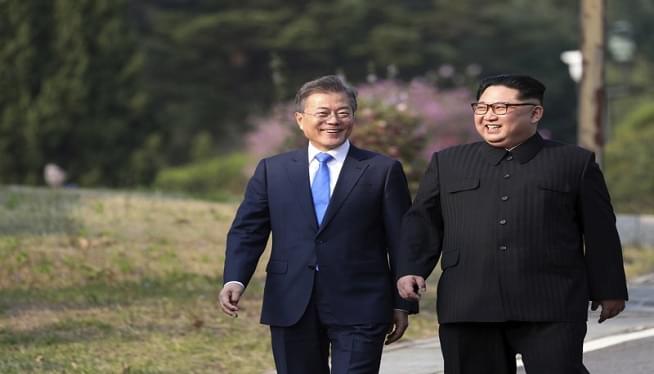WASHINGTON — President Donald Trump claimed credit Friday for a historic inter-Korean summit and insisted that the United States was “not going to be played” by North Korean leader Kim Jong Un.
Trump said the U.S. had narrowed down to two or three locations his planned meeting with Kim. The U.S. president pushed back against critics who doubt the North Korea dictator is really willing to give up the nuclear weapons his nation took decades acquiring.
“I don’t think he’s ever had this enthusiasm for somebody, for them wanting to make a deal,” Trump said in the Oval Office as he met German Chancellor Angela Merkel. “We’re not going to be played, OK. We’re going to hopefully make a deal. The United States in the past has been played like a fiddle.”
“That’s not happening to us. We will, I think, come up with a solution. And if we don’t, we will leave the room,” Trump said.
He spoke hours after Kim became the first North Korean leader to visit south of the demarcation line between the two Koreas, meeting with President Moon Jae-in. They pledged in a joint statement to seek a formal end to the Korean War by year’s end and to rid their peninsula of nuclear weapons, without specifying how it would be achieved.
“When I began, people were saying that was an impossibility,” Trump said earlier during an appearance with U.S. athletes who participated in this year’s Winter Olympics in South Korea. “They said there were two alternatives: Let them have what they have, or go to war. And now we have a much better alternative than anybody thought even possible.”
The Kim-Moon meeting was the culmination of a rapprochement that was inspired by the February games.
Responsibility for turning a bold vision for peace into reality will in large part rest with Trump, who has often vowed to succeed where his predecessors as president have failed in eliminating the North Korean nuclear threat to America. His former CIA director and new Secretary of State Mike Pompeo, met Kim four weeks ago in North Korea to prepare the ground for the Trump-Kim summit, tentatively scheduled for May or early June.
“I did get the sense that he was serious,” Pompeo told reporters at NATO headquarters in Brussels, where he was making his first trip as top U.S. diplomat.
Pompeo said the economic pressure on North Korea spearheaded by Trump “has led (Kim) to believe that it is in his best interests to come to the table to talk about denuclearization.”
But Pompeo added a word of caution: “I am always careful. There is a lot of history here. Promises have been made, hopes have been raised and then dashed.”
Major uncertainty still surrounds North Korea’s commitment to “denuclearize” and what it would demand in return. Starting in the early 1990s, the North has built up an atomic arsenal as a deterrent against a U.S. invasion and as a safeguard for the continuance of its totalitarian regime.
Christopher Hill, who was the lead U.S. negotiator with North Korea under the George W. Bush administration, said the onus would be on the Trump administration to work out the details of a deal. Key hurdles would be to establish a timetable for denuclearization and to overcome North Korean reluctance to allow a verification process.
“I’m guided by my experience which was they said all the right things but they gave us a declaration that was not complete and not entirely accurate, and they also failed to give us any kind of verification protocol,” Hill said. “I don’t think we’re anywhere near that issue.”
Vice President Mike Pence alluded to those difficulties, saying the Korean peace agreement was “just one step” toward denuclearization.
“Any talks, promises, and assurances from North Korea will be met with reservation, vigilance, and verification,” he said in a statement, adding that the U.S.-led pressure campaign that has imposed tough sanctions on North Korea would continue.
Those economic restrictions were intensified during a febrile 2017, when the U.S. and North Korean leaders traded threats while Kim pushed his nation to the verge of being able to fire a nuclear-tipped missile at the U.S. mainland. Tensions have eased with Kim’s sudden shift to international diplomacy. Last month, Trump surprised the world by accepting an offer to negotiate with Kim, who has announced a halt to nuclear and long-range missile tests.
Earlier Friday, and with characteristic swagger, Trump had touted the outcome of the summit between Kim and Moon as a breakthrough in the generational standoff. “KOREAN WAR TO END!” he tweeted. “The United States, and all of its GREAT people, should be very proud of what is now taking place in Korea!” The Korean War, in which the U.S. and South Korea fought against North Korea and China, halted in 1953 with an armistice, not a peace treaty.
Trump was also at pains Friday to credit China, North Korea’s traditional ally and main trading partner, for supporting international sanctions that the U.S. credits for Kim’s willingness to halt nuclear and long-range missile tests and re-start negotiations.
Trump tipped his hat to President Xi Jinping first by tweet and then in his Oval Office comments, saying the Chinese leader “has been extremely helpful to me at the border.”
Copyright 2018 The Associated Press. All Rights Reserved. This material may not be published, broadcast, rewritten, or redistributed. (Photo: AP)





















